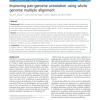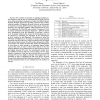54 search results - page 5 / 11 » FastPCMSA: An Improved Parallel Algorithm for the Constraine... |
134
click to vote
CIKM
2009
Springer
15 years 9 months ago
2009
Springer
Background: Although both conservation and correlated mutation (CM) are important information reflecting the different sorts of context in multiple sequence alignment, most of ali...
162
click to vote
BMCBI
2011
14 years 6 months ago
2011
Background: Rapid annotation and comparisons of genomes from multiple isolates (pan-genomes) is becoming commonplace due to advances in sequencing technology. Genome annotations c...
119
Voted
BIBE
2007
IEEE
15 years 8 months ago
2007
IEEE
Abstract—We consider the problem of aligning multiple protein sequences with the goal of maximizing the SP (Sum-of-Pairs) score, when the number of sequences is large. The QOMA (...
130
click to vote
IPPS
2008
IEEE
15 years 8 months ago
2008
IEEE
One of the most commonly used tools by computational biologists is some form of sequence alignment. Heuristic alignment algorithms developed for speed and their multiple results s...
120
click to vote
BMCBI
2008
15 years 2 months ago
2008
Background: We propose a multiple sequence alignment (MSA) algorithm and compare the alignment-quality and execution-time of the proposed algorithm with that of existing algorithm...


